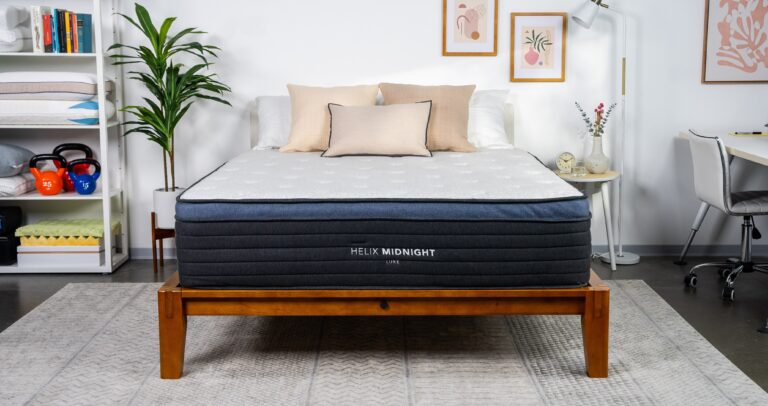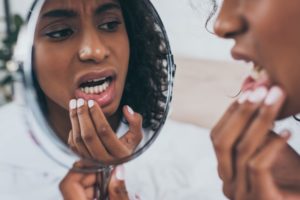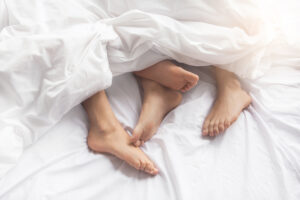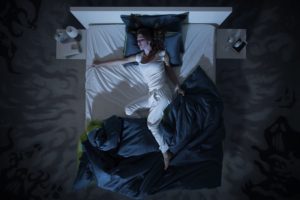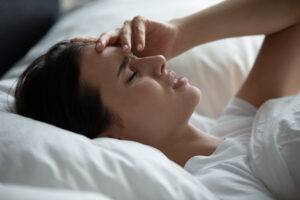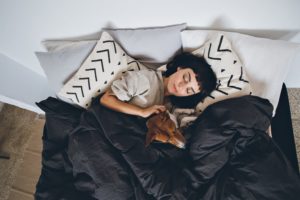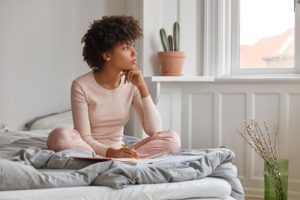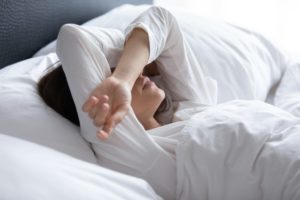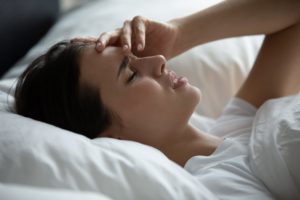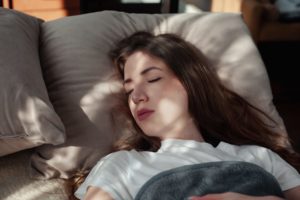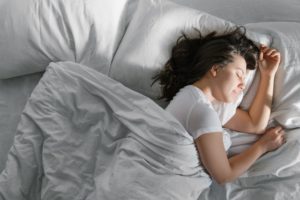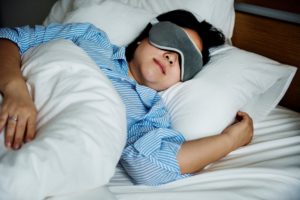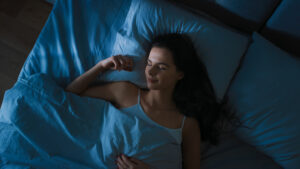When you buy through our links, we may earn a commission. Products or services may be offered by an affiliated entity. Learn more.
Do Blind People Dream?
If you are a sighted person, you likely experience most of your dreams visually, in full color. While in a dream state, you are likely to see people, places, and things that look real, just as you would see them in real life. Perhaps you’ve wondered, do blind people see in their dreams?
The answer isn’t a simple yes or no. Some blind people see full visual scenes while they dream, like sighted people do. Others see some visual images but not robust scenes. Others yet do not have a visual component to their dreams at all, although some researchers debate the degree to which this is true.
Looking to improve your sleep? Try upgrading your mattress.
Do Blind People Have Visual Dreams?
The visual aspect of a blind person’s dreams varies significantly depending on when in their development they became blind. Some blind people have dreams that are similar to the dreams of sighted people in terms of visual content and sensory experiences, while other blind people have dreams that are quite different.
The Congenitally Blind
Researchers tend to disagree when it comes to dreams of the congenitally blind, or those who were born blind. Some experts argue that people who were born blind do not see visual content in their dreams, just as they do not see anything visual while they are awake. Others, however, beg to differ.
People with congenital blindness experience fewer eye movements during the rapid eye movement (REM) sleep phase than their sighted counterparts. Since most complex dreaming happens during the REM stage and eye movements are hypothesized to correlate to visual dream content, this could suggest that people with congenital blindness don’t experience visual content while dreaming.
However, people who became blind at a later age also experience fewer eye movements during the REM stage of sleep. These sleepers do experience visual dream content, suggesting the hypothesis stating that a lack of eye movements during REM indicates a lack of visual dream content is likely untrue. Eye movements made during REM may correlate to visual dreaming in sighted people, but they appear not to in blind people, regardless of when they went blind.
Other experts have noted that people who were born blind report that they experience visual dreams. Like sighted sleepers, blind sleepers can draw some of the visual content of their dreams after they’re awake. Additionally, their EEG activity during dreams they report as visual is similar to the EEG patterns of sighted people during visual dreams.
Although blind sleepers might experience some visual dream content, they likely experience quite a bit less compared to sighted sleepers. Their minds appear to make up for the lack of visual content by increasing other sensory experiences. For example, congenitally blind individuals experience more elements of sound, touch, taste, and smell in their dreams than sighted individuals do.
People Who Went Blind Before Ages Five to Seven
People who were not born blind, but went blind in early childhood, likely experience more visual dream content than those who were born blind, but less than those who went blind later in life. Researchers hypothesize that the later a person goes blind, the more visual content they experience in their dreams.
Research studies categorize blind participants according to different age ranges. People who went blind after ages five to seven tend to have fully visual dreams. People who were not born blind, but went blind before ages five to seven, could experience varying degrees of visual elements in dreams depending on how far along their development was when they went blind.
People Who Went Blind After Ages Five to Seven
People who went blind after ages five to seven tend to have visual dreams. That said, they might not experience as much visual dream content as fully sighted individuals. Like people who went blind at a younger age, those who went blind later often have other sensory elements become more prominent in dreams to make up for the reduced visual content. For example, they tend to experience more tactile or physical sensations while they dream than sighted people do.
The visual dream experiences blind people have aren’t only of people and places they saw prior to going blind. While dreaming, they see things that have entered their life since they’ve become blind. This suggests that while we dream, our minds construct a world rather than replicating one we are familiar with, since someone with complete sight loss doesn’t truly know what something they’ve never seen visually looks like.
What Are Dreams Like for Blind People?
What happens during sleep is similar for both blind and sighted people, although many blind people experience fewer visual images while dreaming. Both groups experience dreams that involve lifelike stories in which they are an actor, having sensory experiences, and interacting with others.
Although their visual dream content is reduced, other senses are enhanced in dreams of the blind. A dreaming blind person experiences more sensations of sound, touch, taste, and smell than sighted people do. Blind people are also more likely to have certain types of dreams than sighted people. For example, blind people seem to experience more dreams about movement or travel and more nightmares.
Do Blind People Have Nightmares?
Like sighted people, blind people experience nightmares. Research has found that blind people have more dreams about travel that involve unfortunate circumstances. Some of these dreams could potentially be considered nightmares. One hypothesis is that the nightmare content may mirror the difficulties blind people face while getting around in their waking life.

Still have questions? Ask our community!
Join our Sleep Care Community — a trusted hub of product specialists, sleep health professionals, and people just like you. Whether you’re searching for the perfect mattress or need expert sleep advice, we’ve got you covered. Get personalized guidance from the experts who know sleep best.
References
7 Sources
-
Nir, Y., & Tononi, G. (2010). Dreaming and the brain: from phenomenology to neurophysiology. Trends in cognitive sciences, 14(2), 88–100.
https://pubmed.ncbi.nlm.nih.gov/20079677/ -
Christensen, J. A. E., Aubin, S., Nielsen, T., Ptito, M., Kupers, R., & Jennum, P. (2019). Rapid eye movements are reduced in blind individuals. Journal of Sleep Research, 28(6), e12866.
https://pubmed.ncbi.nlm.nih.gov/31025801/ -
National Institute of Neurological Disorders and Stroke. (2019, August 13). Brain basics: Understanding sleep., Retrieved May 27, 2021, from
https://www.ninds.nih.gov/health-information/public-education/brain-basics/brain-basics-understanding-sleep -
Bértolo, H., Paiva, T., Pessoa, L., Mestre, T., Marques, R., & Santos, R. (2003). Visual dream content, graphical representation and EEG alpha activity in congenitally blind subjects. Cognitive Brain Research, 15(3), 277–284.
https://pubmed.ncbi.nlm.nih.gov/12527101/ -
Meaidi, A., Jennum, P., Ptito, M., & Kupers, R. (2014). The sensory construction of dreams and nightmare frequency in congenitally blind and late blind individuals. Sleep medicine, 15(5), 586–595.
https://pubmed.ncbi.nlm.nih.gov/24709309/ -
Kerr, N. H., Foulkes, D., Schmidt, M. (1982). The structure of laboratory dream reports in blind and sighted subjects. The Journal of Nervous and Mental Disease, 170(5), 286–294.
https://journals.lww.com/jonmd/Abstract/1982/05000/The_Structure_of_Laboratory_Dream_Reports_in_Blind.6.aspx -
Hurovitz, C. S., Dunn, S., Domhoff, G. W., & Fiss, H. (1999). The dreams of blind men and women: A replication and extension of previous findings. Dreaming, 9(2-3), 183–193.
https://psycnet.apa.org/record/1999-11074-006


